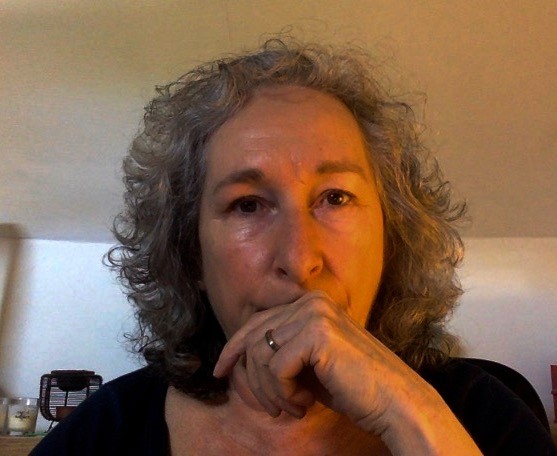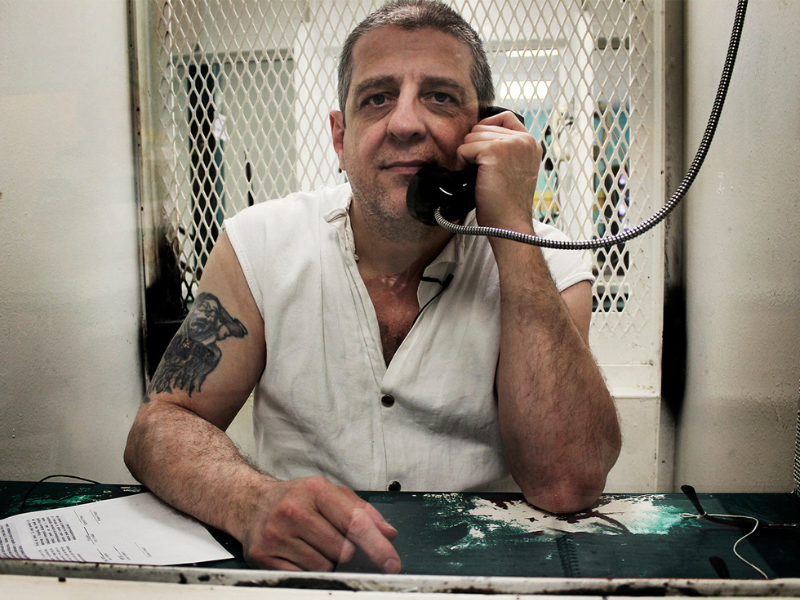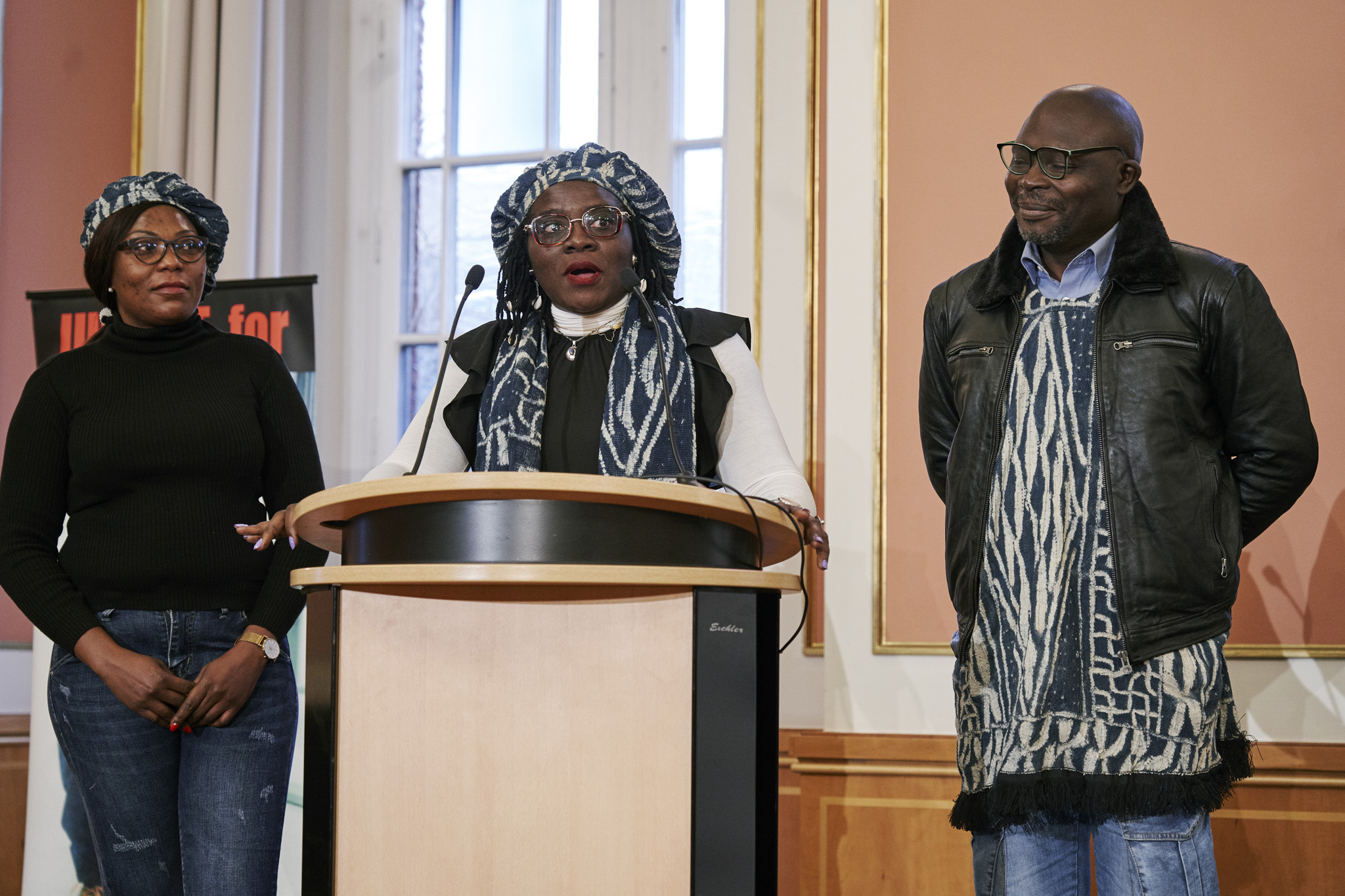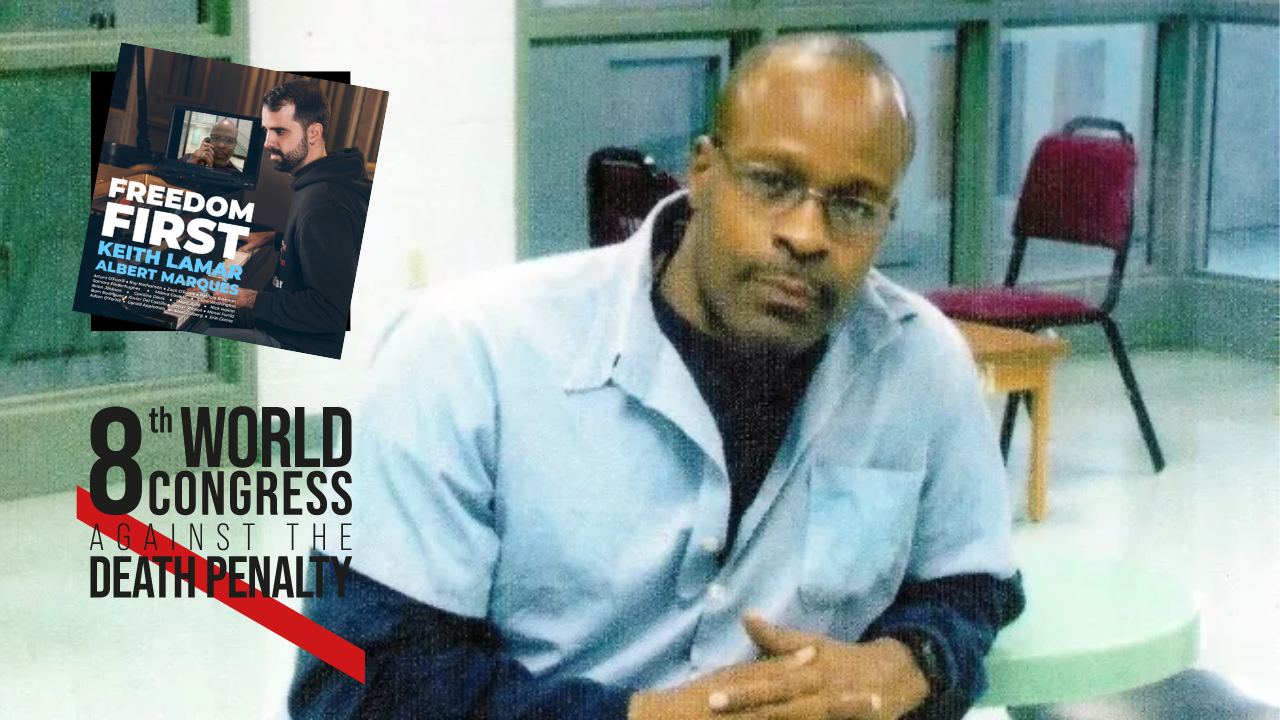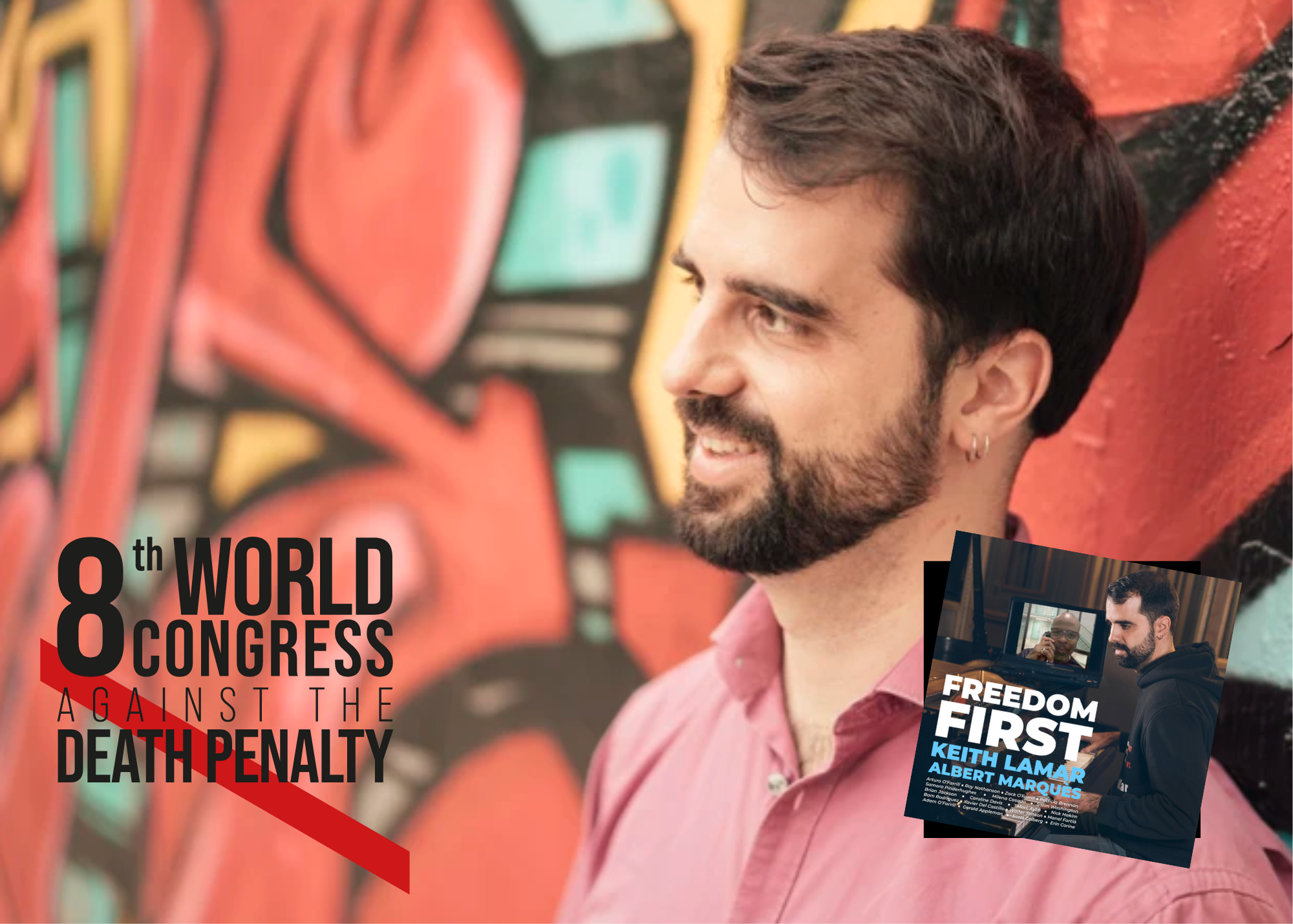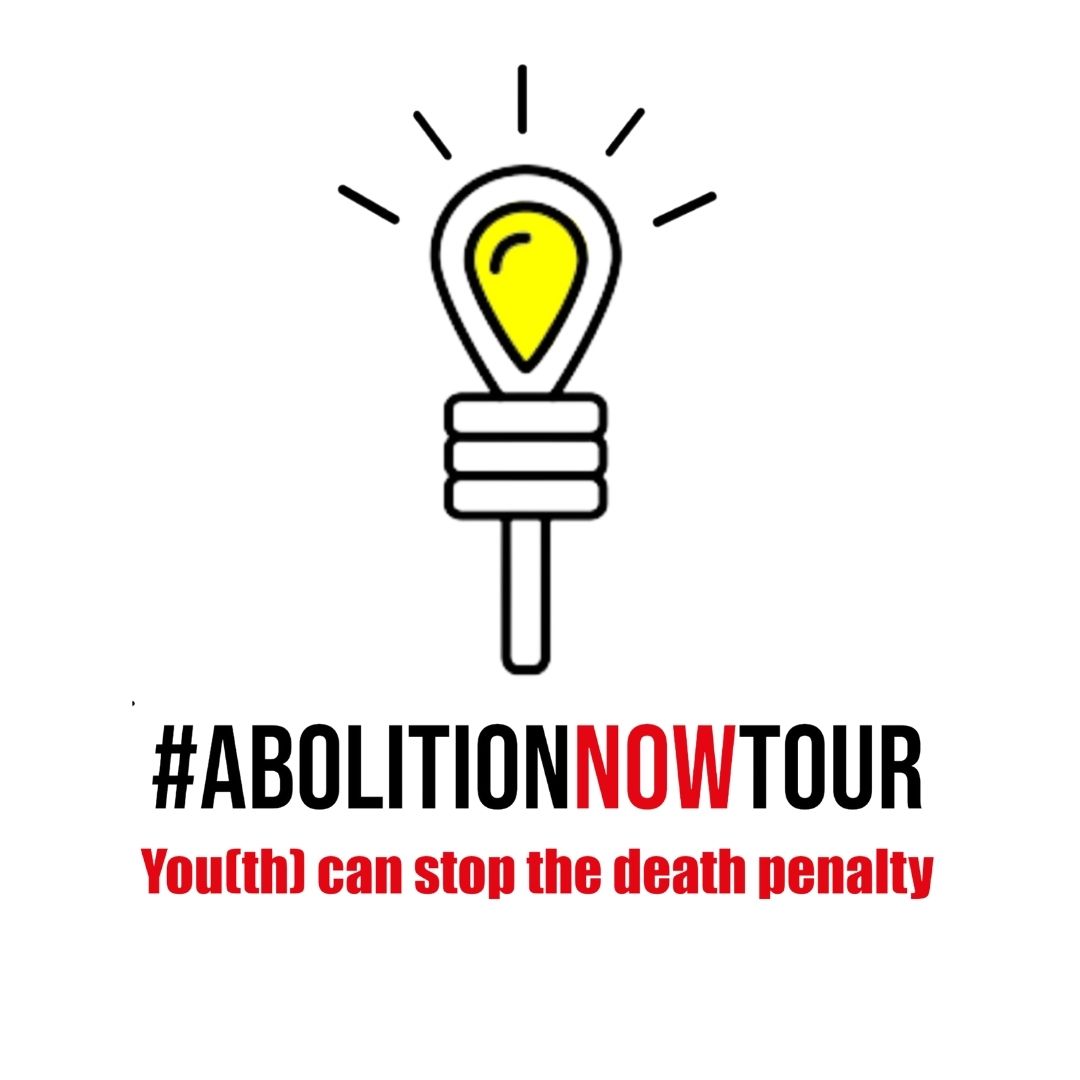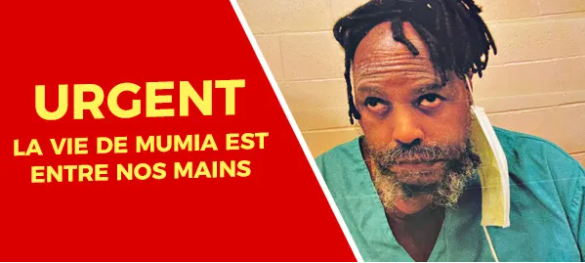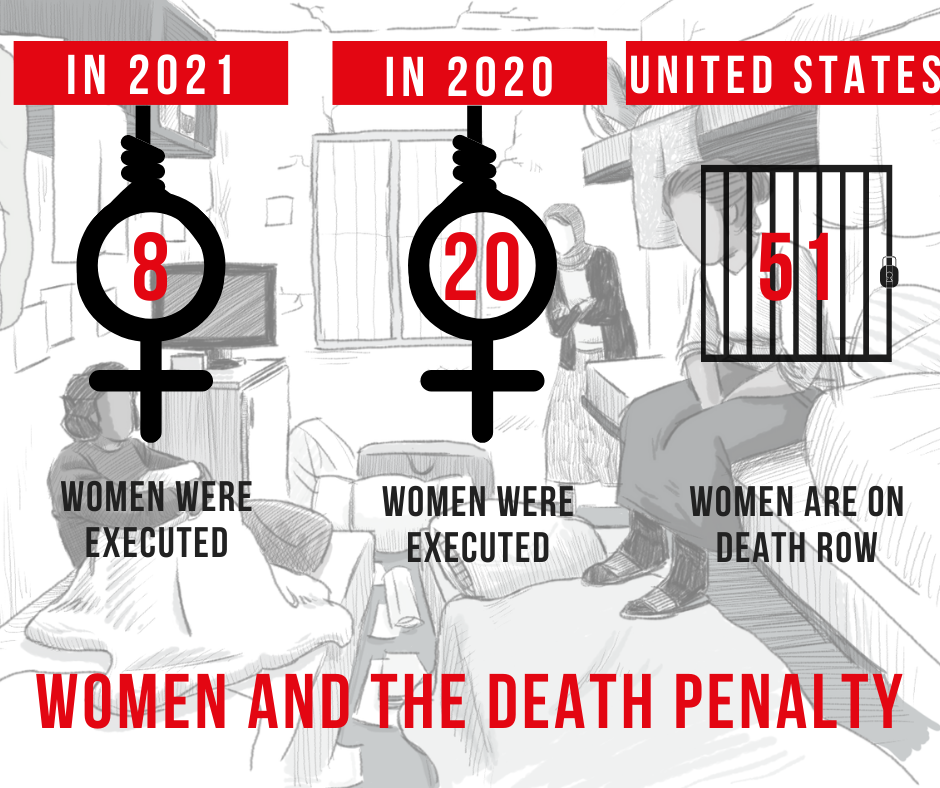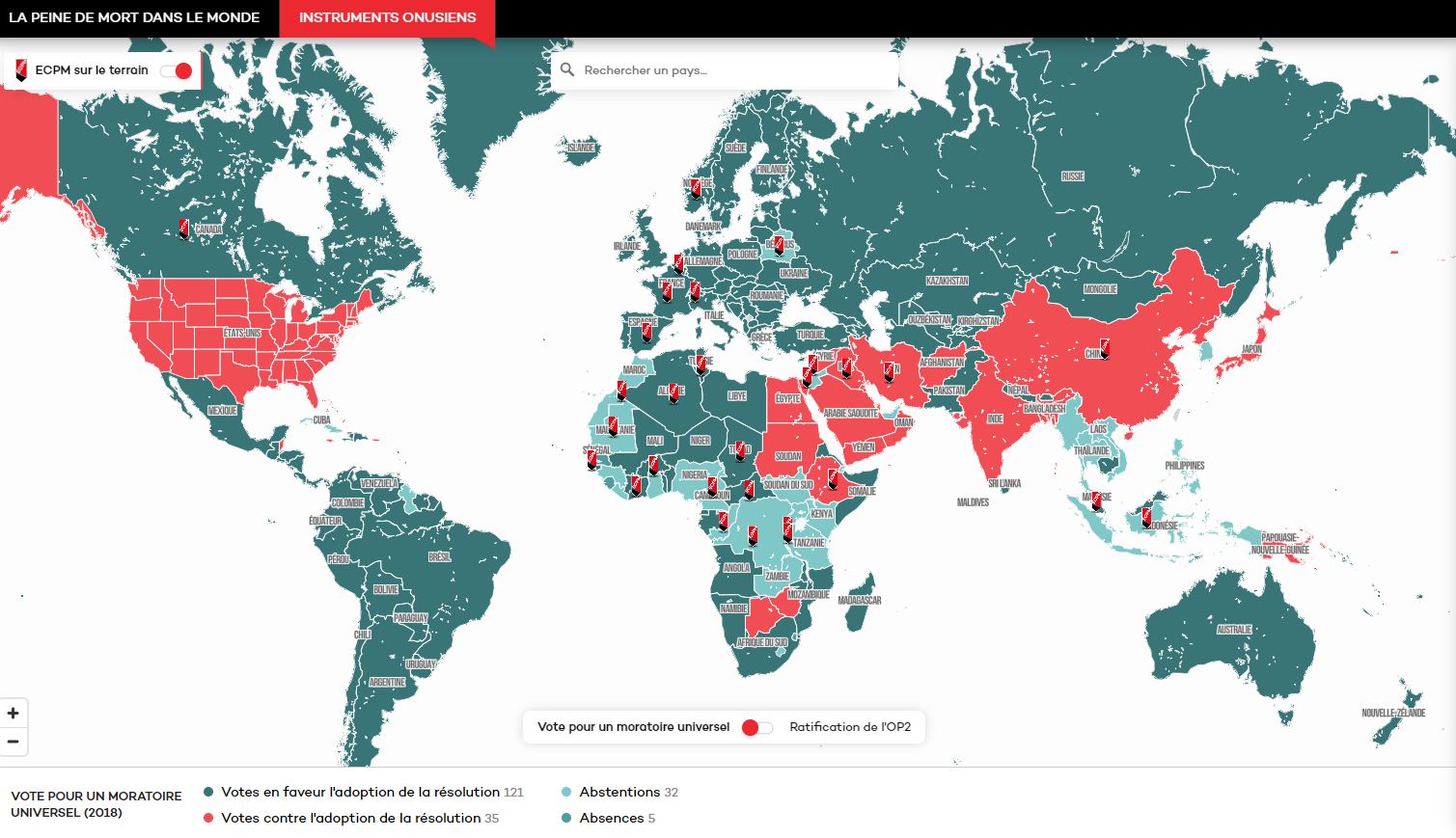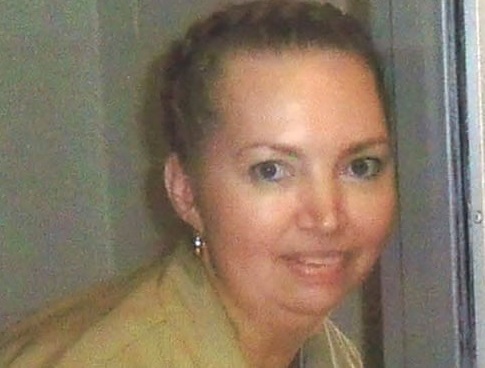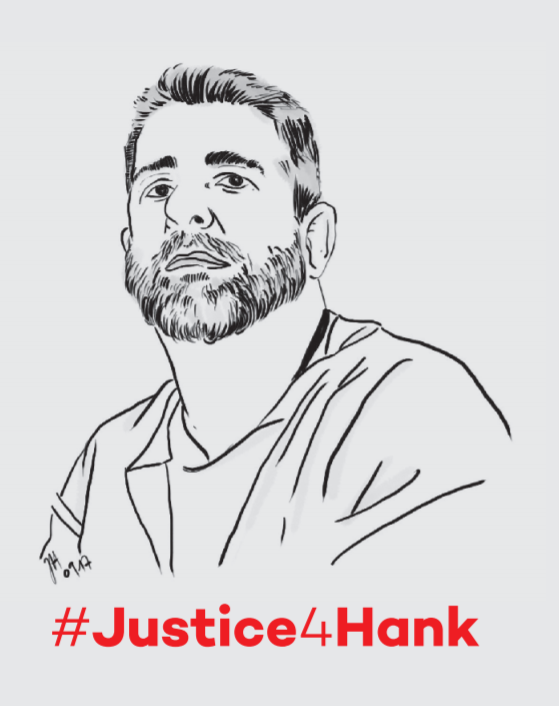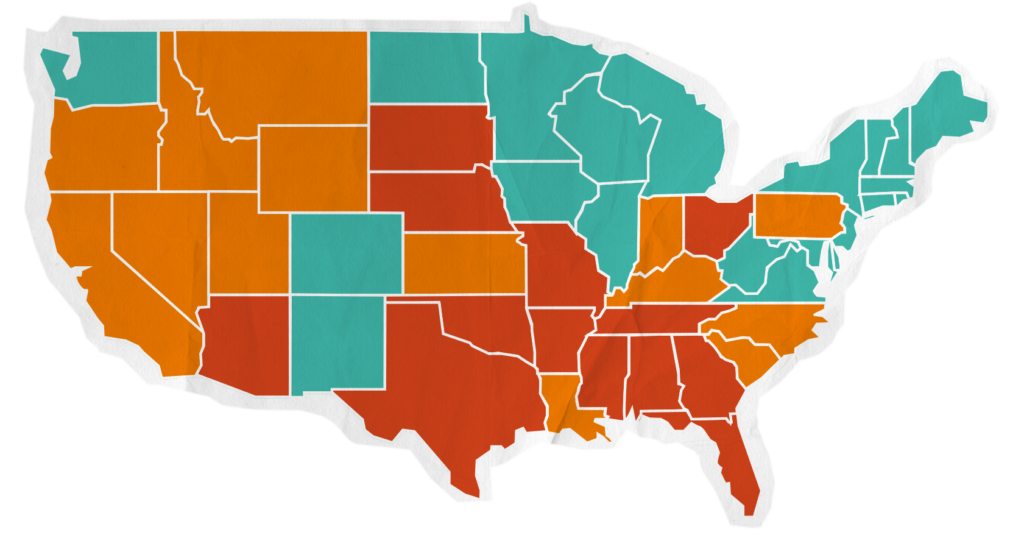
Despite the fact that the death penalty is still applicable in 27 states, 6 states decided to officially put it on hold. In fact, only a small minority of states still practice it.
The number of sentences to the death penalty went from 166 in 2022 to 21 in 2023. However, more than 2200 people were still on death row by the end of 2023 – more than a quarter of them were in California, where the governor ratified a moratorium in 2019.
On one hand, several democrats regret that Joe Biden could not fulfill his promise to abbolish the capital punishment, at leats on federal crimes. On the other hand, some Republican conservatives prepare the Trump administration to execute these federal convicted on death row if it wins the election.
Where do Donald Trump and Kamala Harris stand on the issue ?


Donald Trump has never hidden his support for the death penalty, which he wants to see applied to a broader range of crimes. During his term at the White House, protocols were modified to facilitate executions for those sentenced to death for federal crimes.
A group of Republican conservatives published a « transition plan » called Project 2025, in case Donald Trump wins the election. This document calls for the administration to do everything within its power to execute the 44 federal prisoners currently on death row.
Kamala Harris, in the meanwhile, has remained completely silent on the issue since the beginning of her campaign. The subject is not even mentionned in her electoral platform.
During her inaugural speech as the procuror of San Fransisco in 2004, she mentioned that she would « never charge the death penalty ». This choice was presented as a moral decision. Since then, her stance on the death penalty evolved depending on the circumstances she met as an elected official.
The issue from an expert’s perspective
Keywords: death penalty, miscarriages of justice, sex child abuse, Florida, Tennessee
Abstract: In 2023, Florida, a US state with a high rate of miscarriages of justice has suppressed the requirement of the unanimity of the jury for a death sentence. None of the few US states that still use the death penalty has gone this far. At the same time, the same state followed by Tennessee in May 2024, extended the use of the death penalty to cases of child sexual abuse where no death has occurred, an area where miscarriages of justice are particularly common. In addition, the use of the death penalty for this purpose blatantly disregards a 2008 US Supreme Court ruling and ignores the opinion of associations of social professionals who have drawn attention to the harm that the imposition of the death penalty for child rape actually does to the very children it is intended to help.
Miscarriages of justice
From the reintroduction of the death penalty in 1976 to the end of 2023, 105 people were executed in Florida and 30 were exonerated. This is an appalling rate of one exoneration for every 3.5 executions. The exoneration of a death row prisoner is the result of years of appeals and legal battles, resulting in an officially recognized miscarriage of justice, a reversal of the death sentence and, in some cases, costly financial compensation from the state. The number of exonerations does not represent the total number of innocent people wrongly sent to death row. Not all innocent people are able to gather the evidence needed to overturn a wrongful conviction. And not all are represented by an experienced and competent lawyer. So some innocent people are executed. The Death penalty Information Center (DPIC) published a list of cases [1], but determining or estimating their total number is mission impossible because investigations are stopped after an execution.
It is a terrible injustice and a traumatic experience to be falsely accused and sentenced to prison. But it is even worse when the sentence is death : to be thrown on death row, waiting for the day when the state that is supposed to protect its citizens comes to kill you for a crime you did not commit. It is not surprising that many call this a form of torture. Talking about the horrors of this injustice without at least giving some names, without giving some real examples, is almost like learning to swim without going into the water.
Robert DuBoise [2] is one of these 30 cases of egregious miscarriages of justice in Florida. Convicted of capital murder and attempted sexual battery, he was sentenced to death in the electric chair. Exonerated after 37 years of wrongful imprisonment, he filed a lawsuit against the City of Tampa, against four police officers who investigated the case, and against the forensic dentist who testified that his teeth matched an alleged bite mark on the victim. DuBoise won the case. The city of Tampa, Florida, will pay $14 million [3] in damages, with $9 million to be paid in 2024, $3 million the following year and $2 million in 2026.
Clifford Williams [4] is another example of these 30 wrongful convictions in Florida. It took 42 years of rotting on death row for the justice system to conclude that the physical and scientific evidence actually contradicted the testimony of what happened. His mother died while he was on death row. He did not see his two children grow up. Williams did not benefit much from the financial compensation he received. He was diagnosed with cancer shortly after leaving prison and died 5 years later, aged 80, in January 2024.
Republican Governor George Ryan, referring to the 13 miscarriages of justice in his state (Illinois), said: “For that to happen even once is unjust. For that to happen thirteen times is shameful and beyond belief” [5]. Well, in Florida it is not 13, it is 30. Twice “beyond belief”.
The high rate of miscarriages of justice in Illinois has led to the abolition of the death penalty. Twenty-two other US states have done the same. In Florida, where the number of miscarriages of justice was twice as high as in Illinois, death sentences were made easier. Florida lowered the threshold for a jury to recommend the death penalty from unanimity to an 8-4 majority: the lower requirement for juries in the US. In 90% of all exonerations, the death sentence was recommended by a non-unanimous jury, according to the Death Penalty Information Center (DPIC) [6]. This means that non-unanimous juries are responsible for 9 out of 10 cases of innocent people being sent to the death row. Nonetheless, this is Florida’s decision from 2023.
In the state of Florida, which has one of the worst records for miscarriages of justice in the US, lowering the threshold for jury recommendations for the death penalty, not only paves the way for more mistakes in the future and for more exonerations, but it will also cost the state more in financial compensations. But, more importantly, on the human side, more innocent people will be sent to death row to live for years with the agonizing fear of waiting to be killed, years with the psychological trauma of being unjustly in the death row, losing the presence and affection of their loved ones, losing precious working years and potential professional careers.
Tennessee, the only other US state to extend the death penalty to child sexual abuse, in May 2024, has actually suspended executions since April 2022 : “The large number of problems and depths of problems Tennessee had with complying with its protocol raise significant questions about the state’s competency to carry out the death penalty” [7]. A study published in 2018 about Tennessee’s death penalty concluded that the state’s capital-punishment system is “a cruel lottery” that is “riddled with arbitrariness.” [8]
[1] https://deathpenaltyinfo.org/policy-issues/innocence/executed-but-possibly-innocent
[2] https://www.law.umich.edu/special/exoneration/Pages/casedetail.aspx?caseid=5807
[3] Man Wrongfully Imprisoned for 37 Years to Receive $14 Million From City of Tampa – The New York Times (nytimes.com)
[4] https://deathpenaltyinfo.org/news/florida-man-exonerated-42-years-after-wrongful-conviction-and-death-sentence
[5] https://www.pewresearch.org/religion/2002/06/03/governor-george-ryan-an-address-on-the-death-penalty/
[6] https://deathpenaltyinfo.org/news/dpic-analysis-exoneration-data-suggests-non-unanimous-death-sentencing-statutes-heighten-risk-of-wrongful-convictions
[7] Robert Dunham, executive director of the Washington-based nonprofit Death Penalty Information Center. https://apnews.com/article/politics-executions-tennessee-e4c90328bb6317c11bd98bf9dcdeb68a
[8] https://trace.tennessee.edu/tjlp/vol13/iss1/4/
Child sexual abuse
In 2023, Florida passed a law expanding the use of the death penalty to include sexual assault of a child, even in cases where no death has occurred. Tennessee followed suit in May 2024. All other 48 US states have abandoned this approach, most of them long ago, and the Supreme Court has ruled it unconstitutional in 2008.
For the entire United States, since 1989 up to March 2024, the National Exoneration Registry [9] has recorded 322 cases (this number continues to grow over time) in which a person was wrongly convicted of sexually abusing a child and years later exonerated on the basis of new evidence proving their innocence. If in all US states the punishment was the death penalty, as is now the law in Florida and Tennessee, a number of those falsely accused perpetrators would already be in a grave. Buried forever by the state for crimes they did not commit.
Below is the list of all exonerations [10] (wrongful convictions) over the last 25 years, in Florida and Tennessee for sexual child abuse, before those states enacted the death penalty for this type of cases :
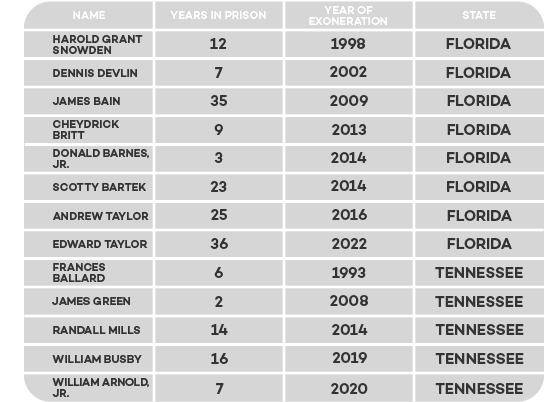
According to the same source, these are the factors that led to wrongful convictions, in the 322 US cases of child sexual abuse (most cases have multiple factors) :
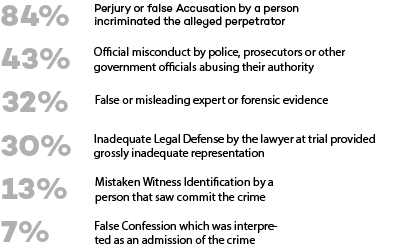
[9] https://www.law.umich.edu/special/exoneration/Pages/Basic-Patterns.aspx
[10] Source: National Exoneration Registry, mars 2024.
Below are a few examples, based on the National Registry of Exonerations, of serious miscarriages of justice that resulted in exonerations related to child sexual abuse in Florida before the new law was passed making this type of case punishable by death.
Donald Barnes [11]
In 2009, the 16-year-old niece of Donald Barnes, 37, accused him of sexually abusing her in Sarasota, Florida, from the time she was six years old until she was 12 years old. Barnes was convicted of sexual abuse of a victim under the age of 12 and sentenced to life in prison without parole. In 2013, Barnes’ niece told prosecutors that the abuse did not take place and that she had lied. During her testimony, the niece was asked how she came up with the details of the alleged sexual penetrations. She said she had been watching pornography on a computer and that when state investigators told her she needed to provide more details, she used details from the videos she had seen. Family members all concurred that they had never witnessed any inappropriate behavior between Barnes and his niece. Several family members said in their depositions that the niece had a tendency to seek out attention and to fabricate stories. In 2014, Barnes was exonerated and released after serving three years in prison, but with the current Florida law he could have been sentenced to death.
Scotty Bartek [12]
In February 1991, 24-year-old Scotty Bartek was charged with sexual battery in Marion County, Florida, after his 5-year-old daughter G.B. said he sexually molested her. Bartek denied the charges. He was sentenced to life in prison. In 2008, G.B., now 23 and a member of the US Navy, said in a sworn affidavit: “Scott Bartek did not molest, abuse, or touch me in any way that was of a sexual nature…I was coached by my mother into making those claims due to the fact that my mother did not get along with (Bartek).” In 2009, G.B.’s mother wrote a letter saying that the girl had never been sexually abused, that Bartek was innocent and that at one point, she thought she might lose custody. She also said that her daughter was manipulative and confused. In December 2013, Bartek was released and two months later the prosecution dismissed the charges. Bartek could be executed by the state under current Florida law.
Andrew Taylor [13]
On March 1990, police in Miami, Florida, arrested 25-year-old Andrew Taylor on charges of raping his girlfriend’s daughter who was 8. At the trial the girl testified that Taylor had raped her once at her home and once at his home. The girl’s mother, who was Taylor’s girlfriend, testified that in March 1990, she came home and believed that she “smelled a sexual odor” in the air in the girl’s room. An associate medical examiner, testified that the girl had six healed internal tears, consistent with more than one sexual assault. In March 1991, a jury convicted Taylor of sexual battery of a child and sentenced him to life in prison. In 2014, the girl, now 32 years old, confessed to Taylor’s son that she had lied. She met with an investigator and signed a sworn affidavit saying that her mother was a drug addict who often came home drunk and questioned her about whether Taylor had improperly touched her. “Finally, after being beaten extensively, I told my mother that Andrew had touched me so that she would stop beating me”, the woman said in the statement. She said she had rejected overtures from an investigator for Taylor in previous years, but ultimately decided to “stand up and do what is right…I was so afraid of my mother that I thought if I ever told the truth that she would do terrible things to me.”
[11] https://www.law.umich.edu/special/exoneration/Pages/casedetail.aspx?caseid=4501
[12] https://www.law.umich.edu/special/exoneration/Pages/casedetail.aspx?caseid=4975
[13] Andrew Taylor – National Registry of Exonerations (umich.edu)
Donald Barnes, Scotty Bartek and Andrew Taylor were exonerated because the false child allegation was recanted years later, a good fortune not enjoyed by all falsely accused. What these cases also have in common is that their exoneration was possible because they were sentenced to life in prison. Had they been sentenced to death, they might not have survived long enough for their innocence to be proven.
The real-life stories above help to understand the landmark 2008 US Supreme Court ruling [14] that “a death sentence for one who raped but did not kill a child, and who did not intend to assist another in killing the child, is unconstitutional under the Eighth and Fourteenth Amendments.” The Court also added: “There are, moreover, serious systemic concerns in prosecuting the crime of child rape that are relevant to the constitutionality of making it a capital offense. The problem of unreliable, induced, and even imagined child testimony means there is a ‘special risk of wrongful execution’ in some child rape cases.”
In the same judgment, the Court also considered that the death penalty for child rape was counterproductive : “making the punishment for child rape and murder equivalent, a State that punishes child rape by death may remove a strong incentive for the rapist not to kill the victim… the penalty in some respects gives less protection, not more, to the victim, who is often the sole witness to the crime.” And that “It is not at all evident that the child rape victim’s hurt is lessened when the law permits the death of the perpetrator.”
Another argument elaborated by the Supreme Court is the evidence of a national consensus with respect to the death penalty for child rapists which on balance is against it. Indeed, death penalty for child sex abuse has been progressively abandoned in the US. In the country the last individual executed for the rape of a child was Ronald Wolfe 60 years ago, in 1964. Nowadays, besides Florida and Tennessee, none of the 48 other US states has such legislation. In 2008, the National Association of Social Workers and other similar professional associations have sent a amicus brief [15] of 36 pages [16], to the Supreme Court on death penalty for child sex abuse. Those associations made clear that the imposition of the death penalty for child rape in fact harms the very children whom it is intended to help and explained the three serious negative consequences of using death penalty for this purpose :
1. With death penalty fewer victims are identified and fewer abusers are stopped
Executing child rapists worsen the problem of underreporting that already frustrates efforts to combat child sexual offenses. A relatively conservative estimate would be that 500,000 children are sexually abused in America each year but the yearly number of reported cases range from about 83.000 to 217.000 children. A Washington Post investigation published in June 2024, has found that even law enforcement officers (at least 1800 from 2005 and 2022) in the US have sexually abused children while officials at every level of the criminal justice system have failed to protect kids, punish abusers and prevent additional crimes [17]. However, the overwhelming majority of sexual abuse is committed by family members or close family friends. These relationships lead many victims—as well as family members who witness or suspect the abuse—to remain silent rather than to report the crime. For example, victims and other family members may fear the consequences of the abuser’s prosecution and incarceration. Death penalty dramatically aggravates this problem. By magnifying the possible effects of a report of child rape, fewer victims are identified and receive treatment—and fewer abusers are stopped from continuing to abuse their victims and from victimizing even more children. The increasing failure of the system to identify victims produce a variety of harms. Some harm will be immediate, in the form of continued abuse, while others will take years to manifest. Beyond the rise in the number of victims per offender, many former abuse victims may face a host of long-term mental-health and substance-abuse problems.
2. Death penalty encourage abusers to kill their victims
Abusers face no greater penalty for raping and killing their victims than for merely raping them; thus, it is more likely that an abuser will choose to eliminate the victim, who is in many instances the sole witness to the crime.
3. Death penalty magnify the trauma that child victims experience in the criminal justice process
Even ordinary trials are highly traumatic for child victims. Death penalty trials, with their vastly increased publicity, expansive hearings, and multiplying pre-trial and post conviction proceedings, will intensify that trauma by increasing the scope and duration of the child victim’s participation in the criminal justice system. Not only is increased exposure to trials known to hinder child victims’ healing process, but the imposition of a death sentence will add to the guilt child victims sometimes feel and may preclude the possibility of a future therapeutic meeting between the victim and his or her abuser.
In Missuri, during a debate on an attempt to introduce a similar law, Mei Hall, a resident of Columbia who identified herself as a victim of sexual abuse, said [18]:
I don’t wish my abuser death, I wish them to be sequestered away and unable to harm more people, for sure. But I don’t think it’s the state’s place to kill people in general and I don’t think it’s the state’s place to make it more difficult for child victims to come forward.
Mei Hall’s statement reflects the opinion of the vast majority of Americans. A 2019 Gallup poll (the last time this question was asked) found that even for people convicted of murder, 60% of Americans favored life imprisonment, compared to only 36% who preferred the death penalty.
[14] https://deathpenaltyinfo.org/news/excerpts-from-the-supreme-courts-ruling-barring-the-death-penalty-for-non-homicide-crimes-against-individuals
[15] Document sent to a Court with information and advice
[16] https://www.socialworkers.org/assets/secured/documents/ldf/briefDocuments/Kennedy%20v.%20Louisiana.pdf
[17] https://www.washingtonpost.com/investigations/interactive/2024/police-officers-child-sexual-abuse-in-america/
[18] https://missouriindependent.com/2024/03/11/missouri-bill-would-expand-death-penalty-to-certain-sex-crimesagainst-children/
Conclusion
An irreversible punishment makes no sense when it is known that any judicial system fails. And not once or twice but many times. And there are alternative punishments. Life in prison is also a harsh punishment but it is not irreversible. It is barbaric to kill innocent human beings or even just to put them on a death row.
It is very noble to defend an innocent child. But it is equally noble to defend an innocent adult. In the US, hundreds of innocent adults have been falsely accused of child sexual abuse and imprisoned, only to find out years or even decades later that they were wrongly convicted. If the sentence had been the death penalty, many would have been executed before it was discovered that they had not abused any children. Many of these false accusations were made by the alleged victim (a child), others by false testimony, by official misconduct (prosecutors, police and other officials), you name it.
The imposition of the death penalty for child rape harms the very children it is intended to protect, encourages the killing of the victim, the child, and increases the number of unreported cases, as noted by professional associations in the field.
U.S. case law, particularly a 2008 Supreme Court decision, considers the death penalty unconstitutional in cases of rape, warning of the catastrophic risks it presents.
Instead of spending millions of dollars with overly costly system of death penalty, financial resources can be better spent on prevention, protecting children from abuse, and ensuring that survivors have access to mental health treatment and proper support, following offenses. The understanding of the inhumanity of the death penalty is causing its waning in the US and in the World. Last year, Florida was one of only five US states to carry out death sentences, along with Texas, Missouri, Oklahoma and Alabama. And in the world over the last few years, a dwindling number of about 20 of the 193 member states of the UN still carry out executions
Adriano Martins
Note : This article was also published in the USA : https://deathpenaltyinfo.org/facts-and-research/crimes-punishable-by-death/death-penalty-for-child-sexual-abuse-that-does-not-result-in-death




